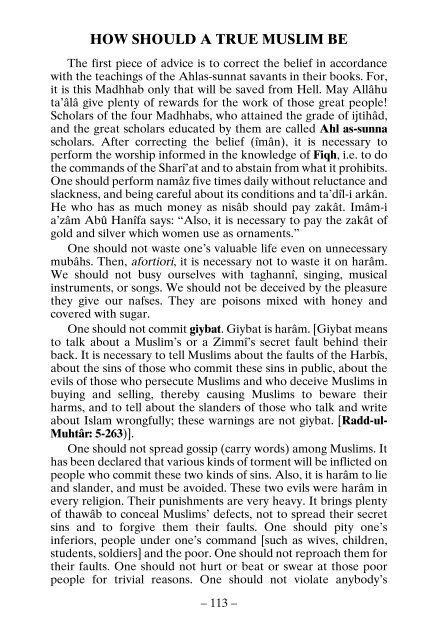The Sunni Path
THE SUNNI PATH The beginning of (The Sunni Path), the book by a statesman of the Ottoman Empire Ahmet Cevdet Pasha (Ma’lûmat-ı Nâfia=Beneficial Information), gives a succinct information about how to believe in the religion of Islam and makes the classification of the science of Islam. Imâm-ı Gazâli, one of the greatest savants of Islam, briefly explains the explanations of Ahl-i-sunnat savants of the true religion of Islam preached by Muhammad ׳alayhissalâm. In addition to this, the life of Imâm-ı A’zam Ebû Hanifa, a great Ahl-i-sunnat savant, is summarized in the book (The Sunni Path). Besides, given are an answer to the slanderers and an explanation to (How to be a True Muslim?)
THE SUNNI PATH
The beginning of (The Sunni Path), the book by a statesman of the Ottoman Empire Ahmet Cevdet Pasha (Ma’lûmat-ı Nâfia=Beneficial Information), gives a succinct information about how to believe in the religion of Islam and makes the classification of the science of Islam. Imâm-ı Gazâli, one of the greatest savants of Islam, briefly explains the explanations of Ahl-i-sunnat savants of the true religion of Islam preached by Muhammad ׳alayhissalâm. In addition to this, the life of Imâm-ı A’zam Ebû Hanifa, a great Ahl-i-sunnat savant, is summarized in the book (The Sunni Path). Besides, given are an answer to the slanderers and an explanation to (How to be a True Muslim?)
You also want an ePaper? Increase the reach of your titles
YUMPU automatically turns print PDFs into web optimized ePapers that Google loves.
HOW SHOULD A TRUE MUSLIM BE<br />
<strong>The</strong> first piece of advice is to correct the belief in accordance<br />
with the teachings of the Ahlas-sunnat savants in their books. For,<br />
it is this Madhhab only that will be saved from Hell. May Allâhu<br />
ta’âlâ give plenty of rewards for the work of those great people!<br />
Scholars of the four Madhhabs, who attained the grade of ijtihâd,<br />
and the great scholars educated by them are called Ahl as-sunna<br />
scholars. After correcting the belief (îmân), it is necessary to<br />
perform the worship informed in the knowledge of Fiqh, i.e. to do<br />
the commands of the Sharî’at and to abstain from what it prohibits.<br />
One should perform namâz five times daily without reluctance and<br />
slackness, and being careful about its conditions and ta’dîl-i arkân.<br />
He who has as much money as nisâb should pay zakât. Imâm-i<br />
a’zâm Abû Hanîfa says: “Also, it is necessary to pay the zakât of<br />
gold and silver which women use as ornaments.”<br />
One should not waste one’s valuable life even on unnecessary<br />
mubâhs. <strong>The</strong>n, afortiori, it is necessary not to waste it on harâm.<br />
We should not busy ourselves with taghannî, singing, musical<br />
instruments, or songs. We should not be deceived by the pleasure<br />
they give our nafses. <strong>The</strong>y are poisons mixed with honey and<br />
covered with sugar.<br />
One should not commit giybat. Giybat is harâm. [Giybat means<br />
to talk about a Muslim’s or a Zimmî’s secret fault behind their<br />
back. It is necessary to tell Muslims about the faults of the Harbîs,<br />
about the sins of those who commit these sins in public, about the<br />
evils of those who persecute Muslims and who deceive Muslims in<br />
buying and selling, thereby causing Muslims to beware their<br />
harms, and to tell about the slanders of those who talk and write<br />
about Islam wrongfully; these warnings are not giybat. [Radd-ul-<br />
Muhtâr: 5-263)].<br />
One should not spread gossip (carry words) among Muslims. It<br />
has been declared that various kinds of torment will be inflicted on<br />
people who commit these two kinds of sins. Also, it is harâm to lie<br />
and slander, and must be avoided. <strong>The</strong>se two evils were harâm in<br />
every religion. <strong>The</strong>ir punishments are very heavy. It brings plenty<br />
of thawâb to conceal Muslims’ defects, not to spread their secret<br />
sins and to forgive them their faults. One should pity one’s<br />
inferiors, people under one’s command [such as wives, children,<br />
students, soldiers] and the poor. One should not reproach them for<br />
their faults. One should not hurt or beat or swear at those poor<br />
people for trivial reasons. One should not violate anybody’s<br />
– 113 –

















